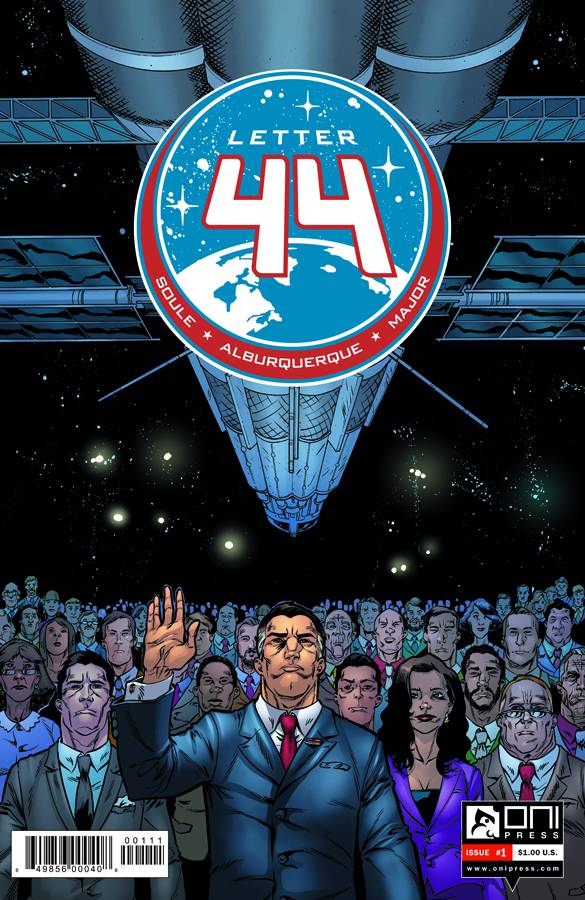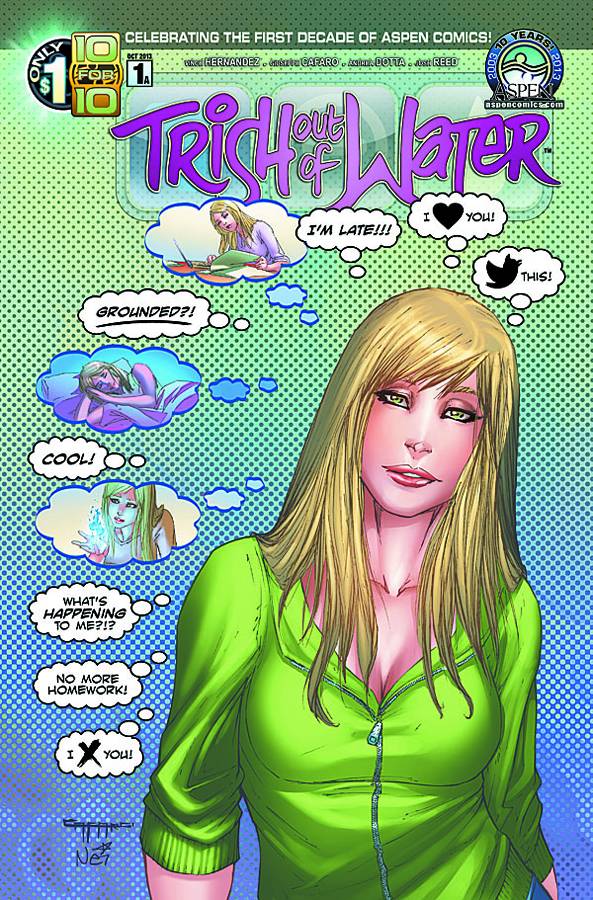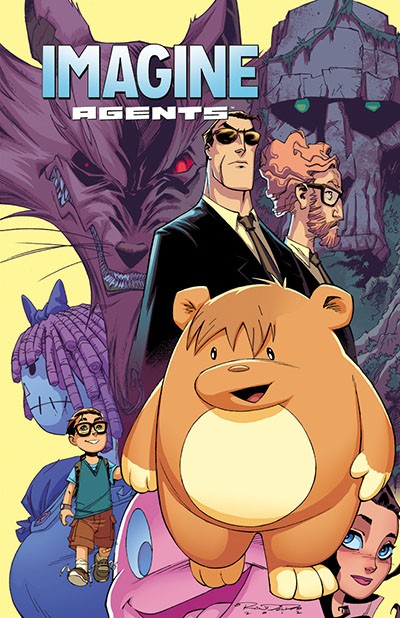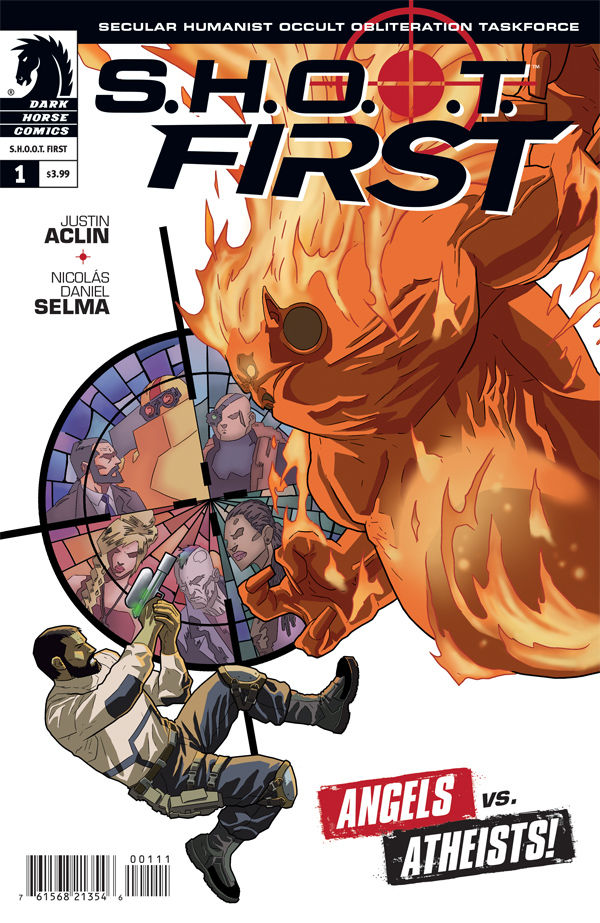We’re No. 1! is a weekly feature looking at first issues in new comic series, as well as one-offs and special releases. In his reviews, Jeff highlights stories with diverse characters and plot lines Geekquality readers can care about, as well as points out comics that miss the mark.
 “Indie” publishers hit the ground hard this week with new #1’s, beginning with Letter 44 from Oni Press. Stephen Blades is the President-Elect of the United States, succeeding two-term President Francis T. Carroll. Blades was elected to get the country out of Carroll’s overseas wars and he is ready to get the country on the right track. All that changes on his first day in office when her gets a secret letter from his predecessor. It turns out that NASA has discovered unknown alien technology in the asteroid belt between Mars and Jupiter, and the agency has been preparing for a possible invasion by rushing soldiers into combat and moving technology into R&D. What’s more, a mission to observe the alien construction was secretly launched three years prior and is days away from arrival at the site. The book is a farcical look at the possible interplay of real world politics and interplanetary discovery and/or catastrophe, and while sometimes humorous, I’m not sure that was the writer’s intent. Written by Charles Soule and illustrated by Alberto Jimenez Alburquerque, the book has obvious parallels to the U.S. President Obama inherited 8 years ago. Soule has fun poking about in the possibilities and conspiracies loved by government watchdogs, fanboys and theorists. What if the continued policies of the government (like the programs conducted by the NSA under both Pres. Bush and Pres. Obama’s watch) are part of a grander undertaking, something beyond the perceived understanding of the public? The tale says a lot about who we are and who we might be, a nation unprepared to deal with such a monumental discovery. The characters in the book are all dealing with it in unusual ways themselves, from Pres. Blades’ disbelief one moment and unwavering patriotism the next, to the fatalist ideals of the astronauts after a three year voyage and discovery of the alien site. Even with all that grandiose posturing and layered political commentary, Letter 44 doesn’t forget to be a comic book. The final page pay-off is one of the better comic book moments in the last few months.
“Indie” publishers hit the ground hard this week with new #1’s, beginning with Letter 44 from Oni Press. Stephen Blades is the President-Elect of the United States, succeeding two-term President Francis T. Carroll. Blades was elected to get the country out of Carroll’s overseas wars and he is ready to get the country on the right track. All that changes on his first day in office when her gets a secret letter from his predecessor. It turns out that NASA has discovered unknown alien technology in the asteroid belt between Mars and Jupiter, and the agency has been preparing for a possible invasion by rushing soldiers into combat and moving technology into R&D. What’s more, a mission to observe the alien construction was secretly launched three years prior and is days away from arrival at the site. The book is a farcical look at the possible interplay of real world politics and interplanetary discovery and/or catastrophe, and while sometimes humorous, I’m not sure that was the writer’s intent. Written by Charles Soule and illustrated by Alberto Jimenez Alburquerque, the book has obvious parallels to the U.S. President Obama inherited 8 years ago. Soule has fun poking about in the possibilities and conspiracies loved by government watchdogs, fanboys and theorists. What if the continued policies of the government (like the programs conducted by the NSA under both Pres. Bush and Pres. Obama’s watch) are part of a grander undertaking, something beyond the perceived understanding of the public? The tale says a lot about who we are and who we might be, a nation unprepared to deal with such a monumental discovery. The characters in the book are all dealing with it in unusual ways themselves, from Pres. Blades’ disbelief one moment and unwavering patriotism the next, to the fatalist ideals of the astronauts after a three year voyage and discovery of the alien site. Even with all that grandiose posturing and layered political commentary, Letter 44 doesn’t forget to be a comic book. The final page pay-off is one of the better comic book moments in the last few months.
 The best female character of the week comes from Aspen Comics in Trish Out of Water #1. Trish is about as typical a modern teenager as you could imagine. She’s up to her eyeballs in high school pressures and social media exposure; she’s never without her best friends or her cell phone; and she’s worried that her boyfriend is nice to her because he’s “only interested in one thing.” Trish worries about her body image, she worries when her parents fight, and she definitely is worried when she suddenly develops the ability to manipulate water whenever she’s near it. Typical, right? Her parents – mother in particular – are hiding a big secret from Trish, and she’s not certain she really is ready for it when her life comes violently and shockingly apart. The only flaw in the book is perhaps that Trish is a touch too stereotypical, but that’s a stretch of a criticism to make. Frankly, the fact that she’s practically a stereotype is what makes her character so effective. For the narrative to have value and for us to understand just how disruptive to her life the new supernatural abilities might be, Trish needs to be as normal and as familiar as possible. Writer Vincent Hernandez and his artistic partner Guiseppe Cafaro do a great job of showing Trish to be the insecure teen we all were at one time, right before they shockingly destroy her life.
The best female character of the week comes from Aspen Comics in Trish Out of Water #1. Trish is about as typical a modern teenager as you could imagine. She’s up to her eyeballs in high school pressures and social media exposure; she’s never without her best friends or her cell phone; and she’s worried that her boyfriend is nice to her because he’s “only interested in one thing.” Trish worries about her body image, she worries when her parents fight, and she definitely is worried when she suddenly develops the ability to manipulate water whenever she’s near it. Typical, right? Her parents – mother in particular – are hiding a big secret from Trish, and she’s not certain she really is ready for it when her life comes violently and shockingly apart. The only flaw in the book is perhaps that Trish is a touch too stereotypical, but that’s a stretch of a criticism to make. Frankly, the fact that she’s practically a stereotype is what makes her character so effective. For the narrative to have value and for us to understand just how disruptive to her life the new supernatural abilities might be, Trish needs to be as normal and as familiar as possible. Writer Vincent Hernandez and his artistic partner Guiseppe Cafaro do a great job of showing Trish to be the insecure teen we all were at one time, right before they shockingly destroy her life.
 Children are front and center in another #1 this week, but they’re much younger in age. Imagine Agents #1 from Boom! Studios and creators Brian Joines (writer) and Bachan (artist) brins us a world where the imaginary friends of our childhood are surprisingly, even dangerously, real. These bits of our youthful imaginations, known as Figments, have come to life and are everywhere, and some of them are not as helpful or friendly as we remember them. A great many of them are the boogeymen in our childhood closets and under our pre-adolescent beds, and the agents of I.M.A.G.I.N.E. are here to protect both us and them. At the heart of the story are a little boy named Elliot, his imaginary bear-like friend Furdelgurr and his mother Rebecca, as well as verteran I.M.A.G.I.N.E. agent Slattery and rookie hipster agent Terry Snowgoose. There’s trouble brewing that involves both Slattery and Rebecca’s pasts, and it’s violently coming to a head. The concept is creative and unique, with a touch of sadness. While many children had warm and cuddly creatures for imaginary companions, Joines reminds us that not all kids had it easy, and some of them had lives both real and imaginary that were much darker than they should have been. It’s an interesting take on childhood innocence, and how all too often and too early it is lost. This makes for a compelling and somewhat sobering read, despite the whimsical artistic style and seemingly light subject matter.
Children are front and center in another #1 this week, but they’re much younger in age. Imagine Agents #1 from Boom! Studios and creators Brian Joines (writer) and Bachan (artist) brins us a world where the imaginary friends of our childhood are surprisingly, even dangerously, real. These bits of our youthful imaginations, known as Figments, have come to life and are everywhere, and some of them are not as helpful or friendly as we remember them. A great many of them are the boogeymen in our childhood closets and under our pre-adolescent beds, and the agents of I.M.A.G.I.N.E. are here to protect both us and them. At the heart of the story are a little boy named Elliot, his imaginary bear-like friend Furdelgurr and his mother Rebecca, as well as verteran I.M.A.G.I.N.E. agent Slattery and rookie hipster agent Terry Snowgoose. There’s trouble brewing that involves both Slattery and Rebecca’s pasts, and it’s violently coming to a head. The concept is creative and unique, with a touch of sadness. While many children had warm and cuddly creatures for imaginary companions, Joines reminds us that not all kids had it easy, and some of them had lives both real and imaginary that were much darker than they should have been. It’s an interesting take on childhood innocence, and how all too often and too early it is lost. This makes for a compelling and somewhat sobering read, despite the whimsical artistic style and seemingly light subject matter.
 This is a week with creators taking potshots at ideas we hold dear, especially with Dark Horse Comics’ latest, S.H.O.O.T. First #1. (It’s also quite the week for acronyms, and the jokes about what they spell. Apparently Whedon’s influence is more contagious than we might have thought). S.H.O.O.T. is the Secular Humanist Occult Obliteration Taskforce, a collection of agents out to destroy the actual religious deities that hold together the faiths of the world. The agency fights to destroy the things they no longer believe in, oddly enough. Turns out that angels, demons, and jinn alike have been with us all along, assuming certain forms and keeping alive old religions just so that they can, in turn, feed themselves on people’s faith. It’s a powerful force in the universe, apparently, and these protectors of humanity have decided it’s time for us to determine our OWN destiny from here on out. It’s fairly easy to see where readers of faith might find this book offensive. Writer Justin Aclin and artist Nicolas Daniel Selma aren’t aiming to suggest that any one belief isn’t real, but rather that those who have chosen to live lives of faith have somehow been duped. The agents of S.H.O.O.T. certainly do keep people safe from unfriendly otherworldly entities, and the team is a good mix of both men and women of color, but they also consider the people they fight to protect to be ignorant for accepting their belief systems on faith. While I’m certain that the book intended to shine light on the concepts of faith and religion, and perhaps to look at the problems in using religion as an excuse for violence and exclusion, it ultimately proves insulting by suggesting peaceful, thoughtful people of faith are no more than fools themselves.
This is a week with creators taking potshots at ideas we hold dear, especially with Dark Horse Comics’ latest, S.H.O.O.T. First #1. (It’s also quite the week for acronyms, and the jokes about what they spell. Apparently Whedon’s influence is more contagious than we might have thought). S.H.O.O.T. is the Secular Humanist Occult Obliteration Taskforce, a collection of agents out to destroy the actual religious deities that hold together the faiths of the world. The agency fights to destroy the things they no longer believe in, oddly enough. Turns out that angels, demons, and jinn alike have been with us all along, assuming certain forms and keeping alive old religions just so that they can, in turn, feed themselves on people’s faith. It’s a powerful force in the universe, apparently, and these protectors of humanity have decided it’s time for us to determine our OWN destiny from here on out. It’s fairly easy to see where readers of faith might find this book offensive. Writer Justin Aclin and artist Nicolas Daniel Selma aren’t aiming to suggest that any one belief isn’t real, but rather that those who have chosen to live lives of faith have somehow been duped. The agents of S.H.O.O.T. certainly do keep people safe from unfriendly otherworldly entities, and the team is a good mix of both men and women of color, but they also consider the people they fight to protect to be ignorant for accepting their belief systems on faith. While I’m certain that the book intended to shine light on the concepts of faith and religion, and perhaps to look at the problems in using religion as an excuse for violence and exclusion, it ultimately proves insulting by suggesting peaceful, thoughtful people of faith are no more than fools themselves.

